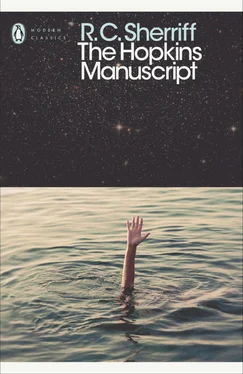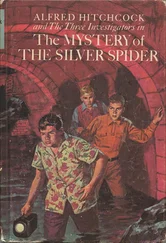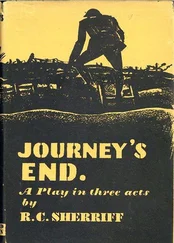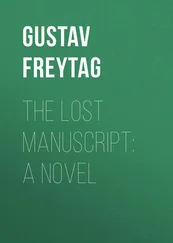Роберт Шеррифф - The Hopkins Manuscript
Здесь есть возможность читать онлайн «Роберт Шеррифф - The Hopkins Manuscript» весь текст электронной книги совершенно бесплатно (целиком полную версию без сокращений). В некоторых случаях можно слушать аудио, скачать через торрент в формате fb2 и присутствует краткое содержание. Год выпуска: 2018, ISBN: 2018, Издательство: Penguin Books, Жанр: sf_postapocalyptic, humor_satire, на английском языке. Описание произведения, (предисловие) а так же отзывы посетителей доступны на портале библиотеки ЛибКат.
- Название:The Hopkins Manuscript
- Автор:
- Издательство:Penguin Books
- Жанр:
- Год:2018
- ISBN:978-0-241-34908-3
- Рейтинг книги:4 / 5. Голосов: 1
-
Избранное:Добавить в избранное
- Отзывы:
-
Ваша оценка:
- 80
- 1
- 2
- 3
- 4
- 5
The Hopkins Manuscript: краткое содержание, описание и аннотация
Предлагаем к чтению аннотацию, описание, краткое содержание или предисловие (зависит от того, что написал сам автор книги «The Hopkins Manuscript»). Если вы не нашли необходимую информацию о книге — напишите в комментариях, мы постараемся отыскать её.
The Hopkins Manuscript — читать онлайн бесплатно полную книгу (весь текст) целиком
Ниже представлен текст книги, разбитый по страницам. Система сохранения места последней прочитанной страницы, позволяет с удобством читать онлайн бесплатно книгу «The Hopkins Manuscript», без необходимости каждый раз заново искать на чём Вы остановились. Поставьте закладку, и сможете в любой момент перейти на страницу, на которой закончили чтение.
Интервал:
Закладка:
‘Old and pompous and gouty,’ suggested Pat.
‘He’s probably young and handsome and romantic, and you’ll fall in love with him!’ I answered.
To think that we talked light-heartedly about Major Jagger! – to think that we strolled happily to the house, eager and rather honoured to meet him! How strange it all seems now!
I cannot define the feeling that came over me as I entered Dr Cranley’s drawing-room. It was such a bright, gay room; so charmingly prepared for us with fresh autumn flowers and blazing fire. Joan Cranley came forward and greeted us so happily, and Dr Cranley handed us sherry with such friendship and welcome… and yet, in that same instant I had an overwhelming wish that I had not come.
All my life I have been acutely, abnormally sensitive to the personality of those I come into contact with. When I enter a room of pleasant, simple people I feel happy and at ease, even before I have said a word – even before I am introduced. But if a discordant, unpleasant person is there I feel it immediately: I feel uneasy and unhappy even before I have discovered which of the guests possesses the personality that has disturbed me.
Never have I felt this so acutely as upon my entrance to Dr Cranley’s drawing-room. I felt something near to panic – a helpless longing to escape – and I knew that the reason for it lay in the tall, stooping figure by the fire.
I never discovered why Jagger called himself ‘Major’. Dr Cranley told me afterwards that he knew him before the cataclysm as Professor of Philosophy at some northern university, where Jagger had been a very quiet, strange man, and something of a recluse. At the time of the cataclysm he was living in a big lonely house near Mulcaster, writing books, and becoming more and more of a hermit.
‘The cataclysm seemed to alter his whole personality,’ the doctor told me. ‘He came to live in Mulcaster. His shyness changed to the complete reverse: he never seemed to stop talking – he was full of wonderful ideas – and he was the obvious man to elect as Parliamentary Representative.’
And now, for a night, he had returned to Mulcaster in connection with the reconstruction of the town under the ‘Ten-Year Plan’.
I can see him now as he turned to shake my hand: his thin, slanting mouth, the deep furrows of contemplation drawn downwards from its corners: the deathly pale face with its deep-set, burning eyes and the mane of black hair that waved back from the wide furrowed temples. He seemed so utterly out of place in that light-hearted party and I think that he realised it, for he made no endeavour to join the conversation. Until dinner was served he stood there by the fire, greeting a joke or a gust of laughter with a tired, patronising smile. Peter and Joan Cranley were apparently accustomed to him, but once or twice I saw Pat glance at the dark, stooping figure with shy, puzzled eyes.
During dinner, too, he seemed quite incapable of joining in the happy small-talk of the rest of the party. Once or twice Dr Cranley attempted to draw him in with some question or other, but he would answer briefly and lapse into silence again. Once, in fact, when Joan Cranley asked him to settle a small argument as to whether an attempt would be made to revive the Olympic Games, he was so far away with his thoughts that he seemed unaware of being spoken to, and an embarrassing silence fell as we waited, thinking that he was considering his reply.
As dinner progressed we all, with one accord, endeavoured to sympathise with his mood by making no effort to draw him in. While we talked he sat hunched in his chair, toying listlessly with his food and sitting between courses with his long, thin fingers stroking his chin.
It was not until coffee was served and the butler had left the room, that Major Jagger became dominant: suddenly and startlingly dominant.
We were discussing (more, I think, out of compliment to Major Jagger than for any other reason) the fine achievements of our new Government, and the splendid future that lay so near at hand.
‘The cataclysm,’ I said, ‘was terrible. But it was almost worth while to have achieved this wonderful spirit of friendship and helpfulness between nations. Who would have believed, ten years ago, that a Permanent International Council would one day be sitting at The Hague, not to wrangle and snarl at one another, but to help one another in such splendid ways!’
For the first time in the evening Major Jagger laughed. His laugh was so sudden and unexpected that we all jumped with surprise. For my own part I felt angry at this strange reception of my remark.
‘You are a happy man, Mr Hopkins. I hope you will remain so.’
‘I don’t understand you, sir,’ I stiffly replied.
‘I imagine we have good reason to congratulate ourselves on this new friendship between nations,’ put in Dr Cranley.
There was a short silence. Jagger sipped his coffee, then turned his dark, mocking eyes upon the doctor.
‘Do you imagine a cataclysm – or a hundred cataclysms – can change human nature?’ he said.
‘I think that the changed circumstances that have followed the cataclysm have definitely done so,’ replied the doctor.
There was another silence. I saw a puzzled look in the eyes of the four young people around me – a look of eager, questioning anticipation. Major Jagger slowly sipped his coffee. He relit his cigar with the deliberation of a man who loves an audience and knows when he has got it.
‘The Muller-Henderson report is to be published on Monday,’ he announced. ‘I don’t think that I shall abuse my position by referring to it.’
Despite my aversion to the man I sat up and leant eagerly forward.
In the early spring a well-equipped scientific expedition had left Europe to explore the inland regions of the moon. Led by Dr Muller, the famous Norwegian scientist, and Professor Henderson, of Cambridge University, the personnel had included experts in every branch of science and engineering: the best and most distinguished men of Europe.
The departure of this expedition had aroused great romantic interest when first announced: an inspiring journey of adventure and discovery such as this could scarcely do otherwise. Its progress into the moon’s unexplored regions was reported, for a while, every morning in our newspapers and was read by everyone as though it had been an exciting new fantasy by HG Wells. And then a strange reticence had crept into the reports. We heard less and less about the expedition until rumours began to circulate that it was a dismal failure. Stories were even whispered that it had met with some terrible, mysterious disaster which the newspapers were breaking to us very carefully.
We did not even know that the expedition had returned, much less that its report had been submitted to The Hague Council and was now to be made public. It seemed very mysterious to me.
‘When did they return?’ enquired Dr Cranley.
‘In June,’ replied the Major. ‘They were away for five months. Their report has been before the International Council for nearly four.’ He glanced around the table with the ghost of a smile. ‘I’m afraid there’s trouble. Serious trouble.’
‘Trouble!’ I exclaimed. ‘Why trouble?’
The Major turned his dark, luminous eyes upon me. They seemed to bore into my brain. I felt myself struggling against a horrid, evil magnetism.
‘You are a happy man, Mr Hopkins. I hope you will remain so.’
I was startled by this strange repetition of his previous remark – angered by the impudence of it.
‘I am pleased to say I am a happy man.’
The Major smiled. ‘You have everything you desire?’
‘I have,’ I retorted. ‘And I’m proud of it.’
He turned from me and shrugged his shoulders. ‘I wish that you spoke for the rest of the world,’ he remarked.
Читать дальшеИнтервал:
Закладка:
Похожие книги на «The Hopkins Manuscript»
Представляем Вашему вниманию похожие книги на «The Hopkins Manuscript» списком для выбора. Мы отобрали схожую по названию и смыслу литературу в надежде предоставить читателям больше вариантов отыскать новые, интересные, ещё непрочитанные произведения.
Обсуждение, отзывы о книге «The Hopkins Manuscript» и просто собственные мнения читателей. Оставьте ваши комментарии, напишите, что Вы думаете о произведении, его смысле или главных героях. Укажите что конкретно понравилось, а что нет, и почему Вы так считаете.












